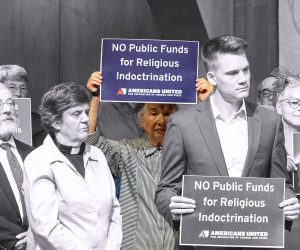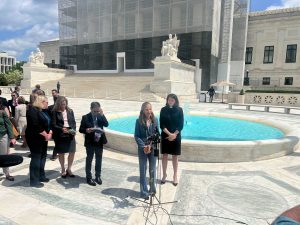
From a church sanctuary in Tulsa, Okla., to the steps of the U.S. Supreme Court in Washington, D.C., Oklahomans made clear they did not want their state to create the nation’s first religious public school.
On April 30, lawyers on behalf of the Trump administration and Christian Nationalist groups Alliance Defending Freedom and the University of Notre Dame’s Religious Liberty Clinic urged the Supreme Court to allow Oklahoma to create and fully fund with taxpayer dollars St. Isidore of Seville Catholic Virtual School — a public charter school that would indoctrinate and discriminate.
Also in the courtroom that morning was the Rev. Lori Walke, senior minister of Mayflower Congregational United Church of Christ in Oklahoma City, a member of AU’s Faith Advisory Council and one of several plaintiffs in a separate lawsuit filed by Americans United and allies to challenge the creation of St. Isidore. Walke joined AU President and CEO Rachel Laser in the courtroom to hear oral arguments in the case; both spoke to the media gathered on the Supreme Court steps afterward.
“As a pastor and as a person of faith, it is so important that we maintain the separation of church and state so that everyone can practice their freedom of conscience and the tenets of their faith as they see fit,” Walke told reporters. “We are very hopeful that the Supreme Court will continue to uphold the foundation of this country: that the government cannot establish a religion and force our very vulnerable schoolchildren to be indoctrinated and coerced into a faith that is supposed to be invitational.”
Before, during and after the case was argued, national and local reporters flooded AU with requests to interview legal experts and clients. Laser even stepped out of the courtroom briefly to provide CNN’s Pamela Brown with live analysis on the case.
“The Republican attorney general of Oklahoma [who filed the case before the U.S. Supreme Court], Oklahoma state law as interpreted by the Oklahoma state Supreme Court, and the charter school associations across this country all agree that charter schools are public schools,” Laser said on CNN. “So what we’re talking about here is the nation’s first religious public school, and that would be a sea change in our democracy — to have noninclusive public schools and force taxpayers to fund a religion that isn’t their own.”

That night, NBC Nightly News included in their report on the case an interview with Erin Brewer of Oklahoma City, a parent of two teens and a representative of OKPLAC Inc. (the Oklahoma Parent Legislative Advocacy Coalition), the lead plaintiff in AU’s case. “For the government to choose a particular religion, to force us as taxpayers to fund it, or to force us as students to study those tenets, that is un-American,” Brewer said. “I value my faith and I have been really proud to impart it to my children. But I don’t need the government’s help.”
Two more AU clients — Erika Wright of Noble, Okla., a mom of two children in public schools, and the Rev. Dr. Mitch Randall of Norman, Okla., a Baptist pastor and member of the Muscogee (Creek) Nation — joined Brewer to explain their objections in a press call AU organized the day before the case was argued.
A portion of Wright’s interview was included in PBS News Hour’s national coverage: “We have two kids in public school right now, and we chose to send them there because we want them to get a quality secular education, while our family and our trusted pastors guide their religious education,” said Wright.
As founder and leader of the Oklahoma Rural Schools Coalition, Wright also has voiced concerns about how St. Isidore would divert resources away from secular, inclusive public schools, especially in rural communities.
Randall spoke of how St. Isidore, as well as other efforts spearheaded by Oklahoma Superintendent of Public Instruction Ryan Walters to insert coercive religion into public schools, reminded him of the country’s troubling history of forcing Indigenous children like his great-grandmother away from their families and into government-run, Christian boarding schools.
The Tulsa World quoted part of Randall’s remarks: “Such schools belong in our past and should not be resurrected for Oklahoma’s future,” Randall said. “We’ve seen time and time again in Oklahoma, in America and across the globe, that both religion and people are harmed when church and state are entangled.”
As Laser and Walke were arriving at the U.S. Supreme Court that Wednesday morning, faith leaders, parents and public school advocates who oppose St. Isidore gathered at Fellowship Congregational United Church of Christ in Tulsa, for a press conference. The Rev. Chris Moore, lead pastor at the church, organized the event in conjunction with Americans United staff, including Vice President of Outreach Brian Silva.
“I join with my colleagues today to make it clear that while we support the excellent educational opportunities that the Catholic community in this state have given our citizens … we cannot endorse the use of public funds for private religious education,” said Moore as he stood surrounded by signs that read “Public schools are not Sunday schools” and “No public funds for religious indoctrination.”
One of the speakers was Melissa Abdo, an AU client, resident of Tulsa County and president-elect of the Oklahoma State School Boards Association. “Opposing St. Isidore of Seville Virtual Catholic School is not about discriminating against the Catholic faith,” she said. “I am Catholic and I oppose the forming of this school because it would violate the fundamental religious rights and freedoms of all Oklahomans who will be forced to pay for this school, whether they’re Catholic or not.”
AU Litigation Fellow Luke Anderson joined Silva at the Tulsa rally and spoke to the media afterward. “What has always been at the core of public education is students learning together across differences, students of varying backgrounds together in one classroom,” Anderson said in an interview published in The Fulcrum, a political news website. “This case today, seeks to fracture that system, that long-standing system of public education that is open to all.”